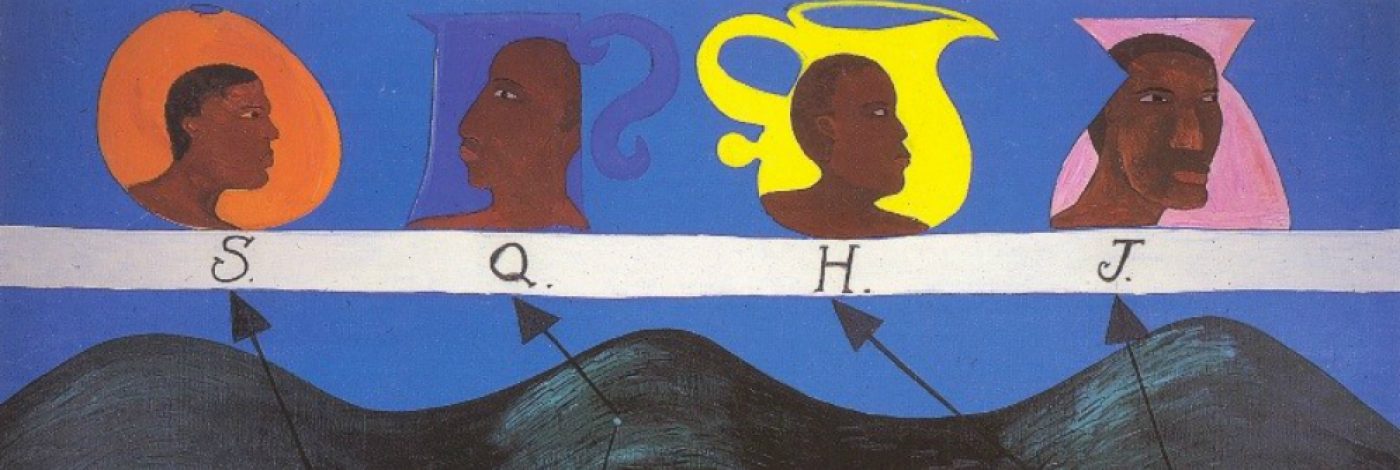In a reggae dance hall session, the vibrations of bass are not only heard but felt. The speakers tingle your skin, clothes, and bones. Bass is everywhere, its low-frequency waves flowing through and around the crowd. Some dancers swim with the rhythms, some let the currents wash over. The DJ and selector curate these sounds while reading dancers’ movements, journeying into unexplored

musical territory or wheeling up the best sounds to play them again. This reciprocal performance synthesises vibe from vibration, for hours, deep into the night.
As cultural scholar and filmmaker Julian Henriques argues, such sensations and processes can be understood together as ‘sonic dominance’ and ‘knowing through sound’.1 This is reggae as a ‘bass/base’ culture, built from the ground up in the street culture of 1970s Jamaica. For Henriques, reggae dance halls epitomise an alternative sonic epistemology: sound disrupts the colonial primacy of text, rationality, vision, and racism in favour of a flattened hierarchy of the senses that is instead noisy, unpredictable, ‘vulgar’, and sexual. The sound system pushes air in ways that can be pleasurable and painful, its technologies capable of being abused if the selector pursues a vibe their dance hall is not in tune with. As Paul Gilroy puts it, Black music facilitates a complex ‘encounter with utopia; with another way of being and thinking and loving and desiring, and experiencing things.’2
This constellation of ideas is increasingly the domain of an interdisciplinary field that I call ‘bass culture studies’, the focus of my current doctoral research in musicology. This space is far from a united discipline, but a few streams of research are discernible. The first centres on the ongoing importance of reggae to popular music, globally and in the United Kingdom in particular, building on historical and ethnographic work by authors including Lloyd Bradley and Michael Veal. For example, a recent essay collection explores case studies of British dub poetry and Nzinga Sounds, one of the United Kingdom’s longest running sound systems led by women.3 Here, reggae is historicised as a bass culture with an ‘Africentric consciousness’, the story of which remains ‘not adequately documented in books or on the university curriculum’.
A second stream tends towards popular music studies by taking a broad genealogical view of reggae as a genre. After reggae and its experimental offshoot known as dub took the world by storm in the late twentieth century, bass culture expanded into a network of subcultures with a fixation on low-frequency sound and the alternative modes of being it engenders. From hip-hop to jungle, this is the ‘dub diaspora’ of contemporary electronic (dance) music, a network with many roots in—and routes out of—the Black Atlantic.4 Dub’s logic of stripping a song to its essential elements of drums and bass and embellishing them can be heard everywhere, such as in the use of simple echo and reverberation effects in chart music, the remix culture built deeply into electronic dance music, or even hip-hop’s tradition of vocal ‘toasting’ over looped drum breaks and bass lines.
In a third stream of research, scholars take Henriques’s lead by focusing on the conceptual weight of bass culture. What are the epistemological implications of ‘knowing through sound’? How can the intensity of a sound system feel both dominant and intimate at once? What does the ‘vibrational ontology’ of dub-reggae teach us about Afrofuturism or Rastafari? Is there a currently unexplored emancipatory potential in bass music, owing to the exclusion of women and marginalised peoples by male-dominated sound systems and dance halls? Some answers to these questions are already being considered in an emerging subfield referred to as ‘black sound studies’.5
In my research, I focus on DJs. I consider how strategies of performance in contemporary scenes—including Bristol, Outlook Festival, and online spaces—relate to local interpretations of Afro-diasporic bass culture and what (or who) counts as belonging to ‘bass music’. DJs are arguably the heart of most bass cultures today, with there being much to learn by listening to their ideas and performances. The specificity and power of bass demands a musicology of bass culture, which my work aims to develop.
- Julian Henriques, Sonic Bodies: Reggae Sound Systems, Performance Techniques and Ways of Knowing(London, New York: Continuum, 2011).
- Bass Culture UK, ‘Bass Culture: Paul Gilroy (part two)’, interview with Jacqueline Springer (published July 2020), 40’03”–47’11”. https://www.mixcloud.com/BassCultureduk/bass-culture-paul-gilroy-part-two/
- William ‘Lez’ Henry & Matthew Worley, Narratives from Beyond the UK Reggae Bassline: The System is Sound (London: Palgrave Macmillan, 2021).
- Paul Sullivan, Remixology: Tracing the Dub Diaspora (London: Reaktion Books, 2014).
- Tavia Nyong’o, ‘Afro-philo-sonic Fictions: Black Sound Studies after the Millennium’, Small Axe 18, no. 2 (2014), 173–179.
Ivan Mouraviev
University of Bristol
fe19330@bristol.ac.uk
Ivan Mouraviev is a third-year PhD student investigating contemporary DJ culture and performance in bass music, supervised by Dr Justin Williams and Dr Florian Scheding. Ivan has published book reviews in Popular Music and Sound Studies and presented research at international conferences on topics including DJ performance analysis, sonic materialism, and bass music festivals. Broader research interests include video game music and music & the internet.

